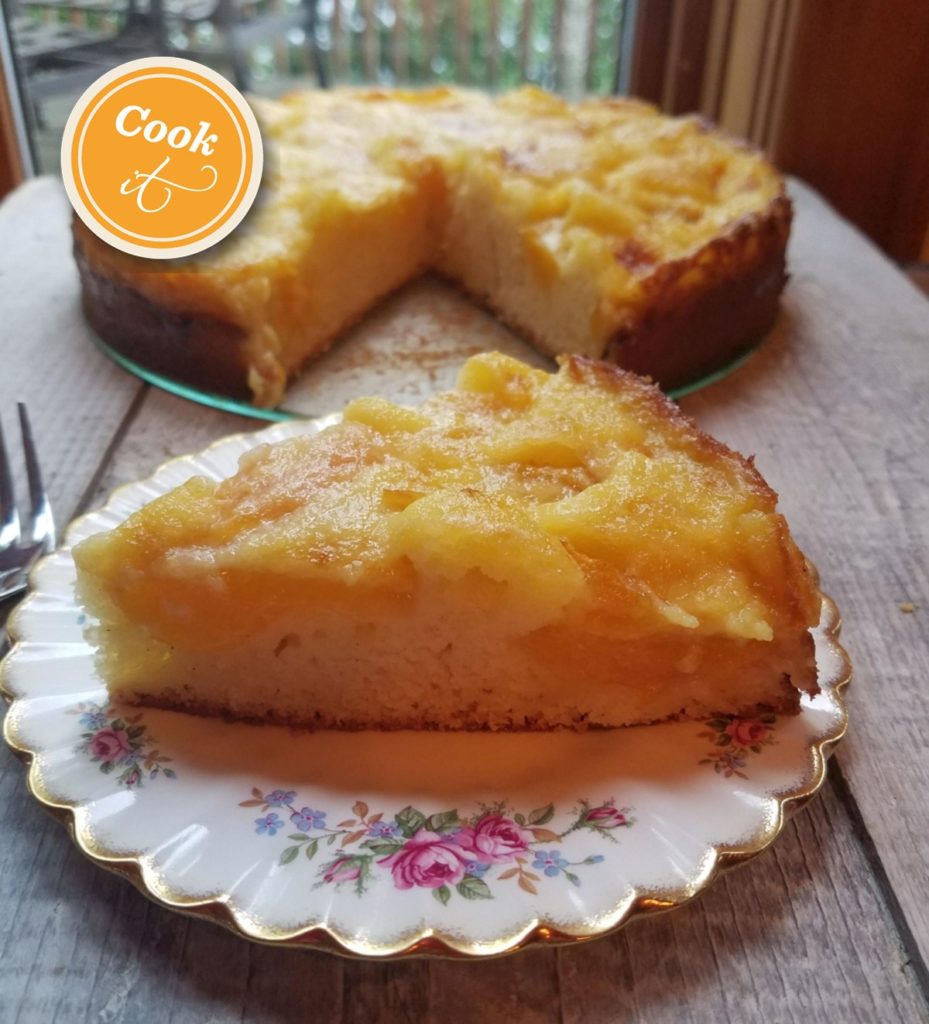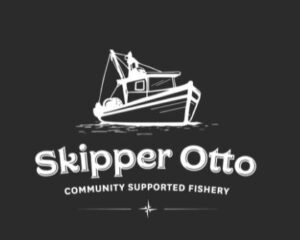The last thing I expected to find in Texas was a spectacular wine. But the sunset bouncing off my glass is adding sparkle to a locally produced Viognier that is flinty and pale, with a floral nose as pretty as the Hill Country scenery. Despite its delicate colour, it’s surprisingly full-bodied, with rich flavours of stone fruit and a suggestion of garden herbs.
There are some 60–odd wineries located in and around Fredericksburg, the Central Texas town that anchors a wine-tourism region second in visitor numbers only to California’s Napa Valley. I’m likely not the only rube who equated Texas with longhorn cattle and cowboy boots, unaware that Lone Star State is the fifth-largest wine producer in the US, and that Texas wines are winning an impressive number of national and international awards. Now I know better.
Most of the Texas grapes used by Hill Country vintners are grown on the High Plains around the city of Lubbock, where the terroir of the Llano Estacado escarpment resembles that of the Rhône Valley and European varietals flourish, but their wineries and tasting rooms are located about 350 miles away, here in the picturesque countryside around Fredericksburg.
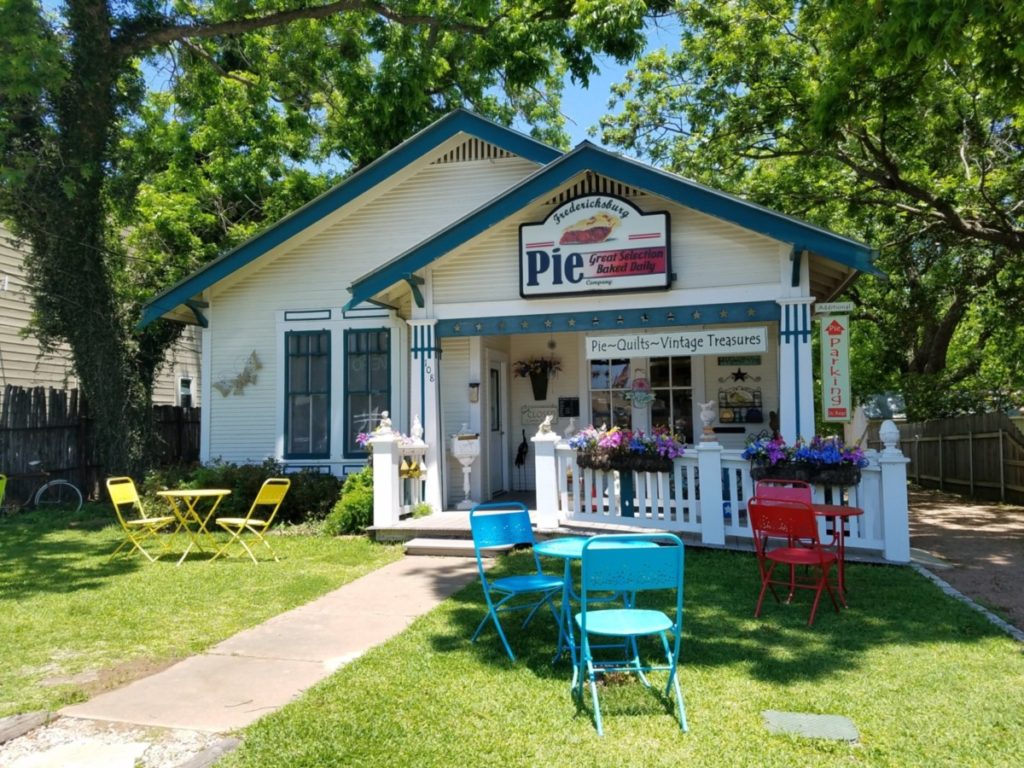
Fredericksburg is a quaint, old-timey town. The German immigrants who arrived by ox-drawn cart in 1846 with a promise of land and a hardy pioneering spirit eventually established a thriving farming community and prosperous town. With a broad main street (still wide enough to turn a bullock team!) bordered by handsome limestone storefronts bedecked with German flags and side streets lined with ‘Sunday Houses’ built from log and stone, Fredericksburg has retained its Teutonic heritage and historic charm. Weekenders from Austin and San Antonio (both about 90 minutes away by road) and visitors from further afield come to Fredericksburg to enjoy wildflowers, peaches, boutique lodgings, eclectic shopping, winetasting and farm-to-table cuisine dished up with warm German hospitality.
Pontotoc Vineyard’s Tasting Room and Weingarten, occupying a stone-walled cottage and courtyard on Main Street, is the bailiwick of lawyer-turned-vintner Carl Money. The fifth generation of a local farming family, Money is one of many Fredericksburg entrepreneurs who are breathing new life into enterprises begun by hard-working ancestors. Money makes vintage wines from grapes he grows in Pontotoc, a small town in Northern Hill Country whose historic buildings he is restoring one by one. As an undergrad in Vienna, he fell in love with the biergarten concept – an outdoor space where families gather to eat, drink and enjoy life in convivial company. His weingarten captures that European sensibility — music, food and wine flow freely, while children (including four of his own) play in a grassy field out back. All of his wines are made exclusively from Texas grapes and all include at least some from his own vineyard. His Estate Tempranillo, with a gorgeous ruby colour and rich flavours of cherry, oak and vanilla, is a standout.
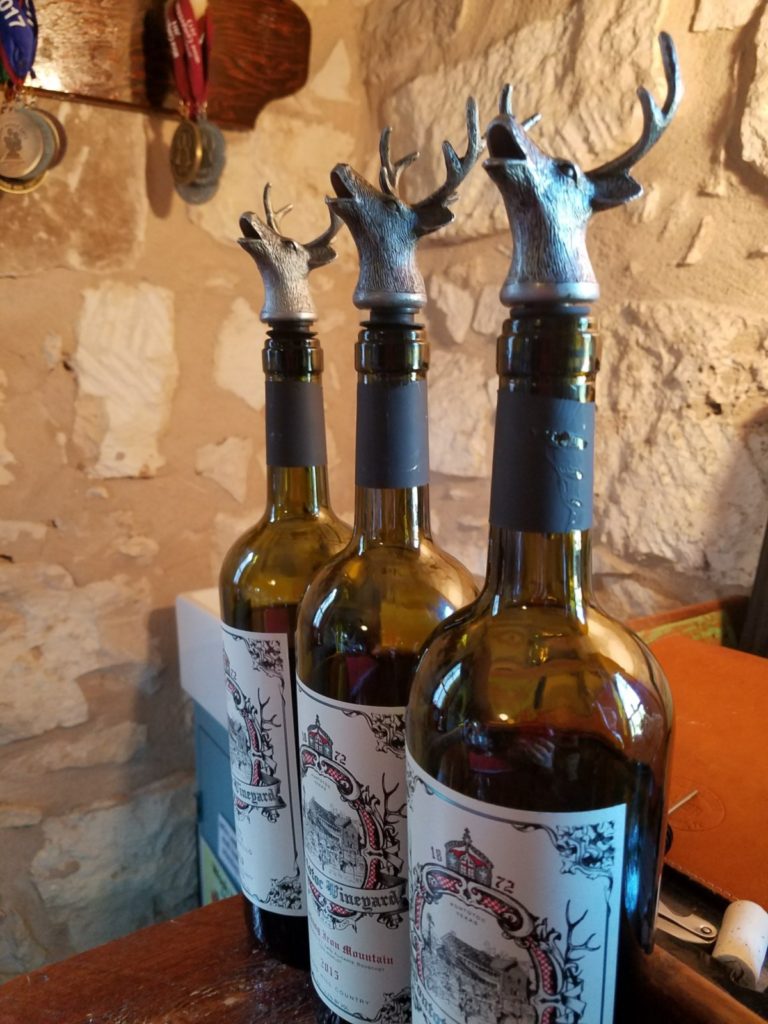
There’s a different atmosphere at Becker Vineyard’s tasting room further down Main Street. Housed in a vintage Buick showroom, this establishment is all elegance and sophistication, with wines to match. Planted in 1992 by Dr Richard Becker, the vineyard was one of the first to be established in Hill Country and Becker’s wines are widely regarded as among the region’s finest. My tasting flight of six vintages, from a silky cinsault to a spicy tempranillo, was a lesson in the complex flavours that can be coaxed from some of these less common varietals.
Grape Creek Vineyards, just outside town on US-290, is an impressive spread styled after a Tuscan estate, with a hilltop villa, a tasting room and a trattoria nestled among oak trees and vines. The trattoria menu features wood-fired pizzas and Mediterranean dishes designed to pair with Grape Creek’s award-winning wines. A carpaccio of prime beef tenderloin, enlivened with zippy fried capers, shaved parmesan and dabs of local chèvre, was a delicious prelude to my winery tour and tasting. Here was another delightful viognier – crystalline, elegant, layered with flavours of fruit and flowers. I wasn’t surprised to learn that it was named Best Viognier in the 2018 Lone Star International Wine Competition.
For a taste of the harder stuff Elk Store Winery & Distillery on Main Street is an altogether funkier scene. Todd Smajstrla’s great grandfather was a moonshiner back in the day, and Todd (with his buddy Scott Hladky) are carrying on the tradition. The lads are proud of their custom-built copper reflux still, which looks like the work of a mad scientist but produces some fine small-batch spirits, including gin, whisky, rum, and a neutral spirit they call ‘shine. Elk Store has a speakeasy vibe, with mixology a main attraction. I’m not a fan of sweet cocktails but the Cool Hand Cuke, a blend of ‘shine, elderflower tonic, cucumber, lemon and soda was a dry, refreshing treat. The Pecan Pie ‘Shine Scott poured next was so good I drank it neat.
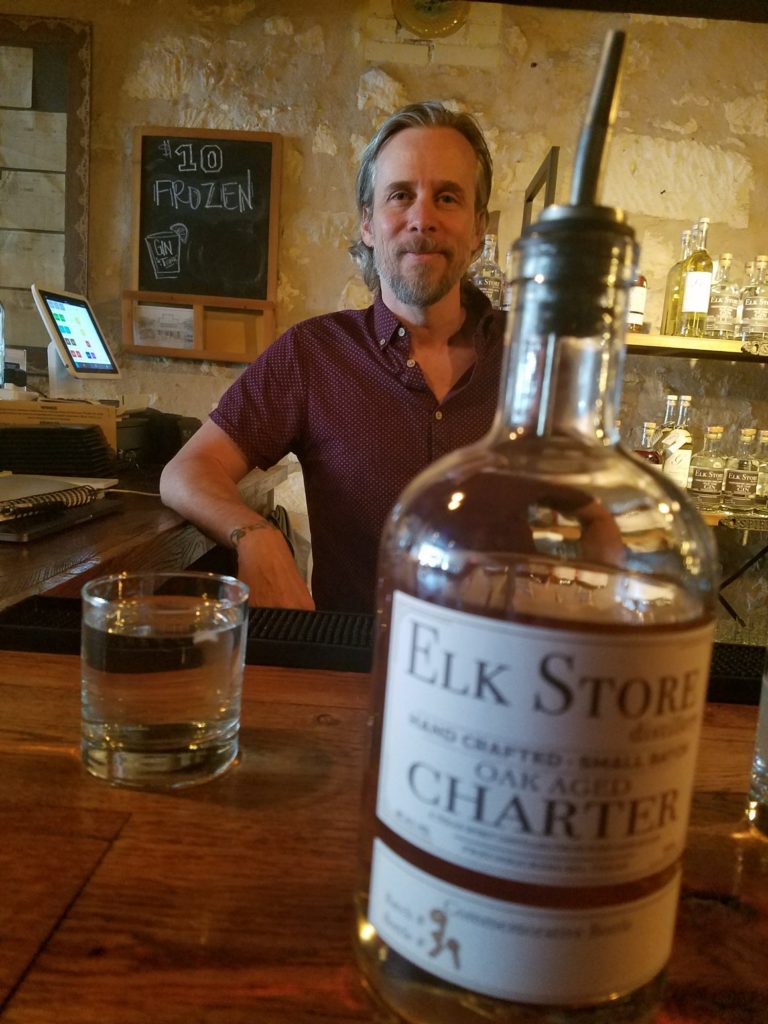
Aside from history and wine, Fredericksburg is famous for the wildflowers that carpet the gently undulating hills in spring and the peaches that follow soon after. I tasted the first fruit of the season, juice dripping down my chin, at Vogel Orchard’s roadside stand on US-290. George and Nelda Vogel planted their peach trees in 1953. Today their son Jamey and his wife Terri run the business. Along with their two kids, the Vogels live in the old family farmhouse not far from the stand, down a road lined with post oak trees. Neatly trained blackberry canes border the kitchen garden that supplies vegetables and melons for their stand, and fruit for Nelda’s pickles and preserves. If you stop at the stand, be sure to try Terri’s peach cobbler served warm from the oven (with a scoop of peach-butter ice cream!).
Further along the highway, Diane and Debbie Eckhardt are the third generation to manage the family orchard, established in 1936. Says their dad, Donald, now in his eighties, “Even when she was a kid, you put that Diane on a tractor, she could drive it!” Down the road apiece at Burg’s Corner, it’s a similar story. Twenty-something identical twins Katelyn and Kristen Duecker now operate their father’s business, including an orchard, a farm stand and a country store packed with peachy goodies and other local products.
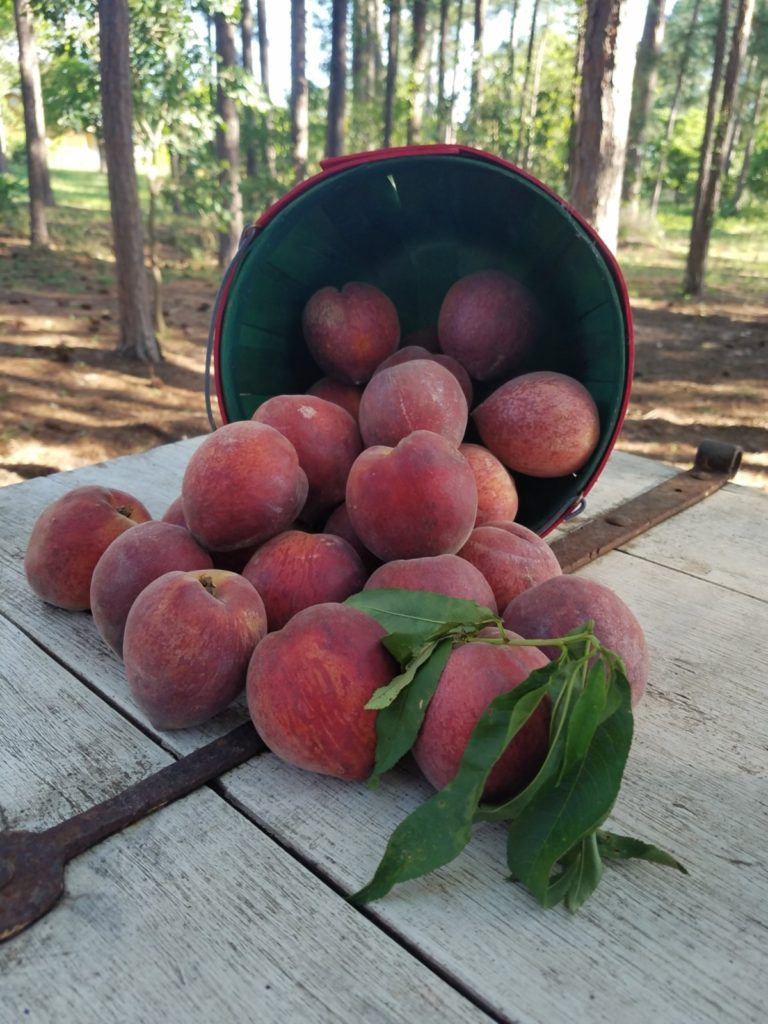
The first to plant peaches in Hill Country was one J.B. Wieser, who, after cotton prices crashed in the 1920s, figured he’d try growing fruit the way folks did back in Germany. Other farmers demurred but by the mid-1930s Fredericksburg peaches were garnering state-wide recognition for their superior taste. Now they’re the area’s premier crop and Wieser’s son Mark, with business partner Carl Fischer, has parlayed the family orchard into a multi-faceted enterprise that includes a specialty food business, wine tasting room and cooking school. Fisher&Wieser occupies a cluster of historic buildings including a vintage log cabin and Das Peachhaus, a former brewery warehouse.
Farm-to-table cuisine is a natural outgrowth of the wine industry in Hill Country. To support the boom in food and wine tourism, the Hill Country University Center in Fredericksburg has partnered with Texas Tech University in a new teaching program with a focus on small-scale farming and food production, winemaking and grape growing. “We have more jobs available in the industry than people to fill them,” says Dr Edward Hellman, who teaches the program. Plans are in place to develop Hill Country University Center into the multi-million-dollar Texas Center for Wine and Culinary Arts, with a teaching winery and kitchens, classrooms, events spaces, student accommodations and other facilities that will support the growth of food and wine tourism in Fredericksburg and the wider region.

Chef Ross Burtwell is widely regarded as the eminence gris of Texas Hill Country Cuisine. His Cabernet Grill restaurant is where locals take out-of-town visitors for a meal that will impress. The ambiance in this barn-style restaurant is casual but service is spot on and food is meticulously prepared with a tight focus on local ingredients. Burtwell is a staunch supporter of small-scale Hill Country food producers and seasonal ingredients such as peaches, blackberries, lavender, pecans, rhubarb, wild game and seafood fill his menus. My springtime degustation began with an amuse of roasted butternut squash soup sweetened with maple and a spike of cayenne. Warm Texas goat cheese with fresh pecans, drizzled with smoked local honey came next, then a quail, wrapped in bacon, stuffed with a jalapeno and served with a lovely sauce of rosemary and raspberry. Niman Ranch short rib on a bed of cheesy grits, with crisply roasted Brussels sprouts was a perfectly executed main course. To finish, a tasting flight of homemade ice creams showcased local ingredients like mint, berries and honey. Each dish was carefully matched with a Texas wine.
The scent of rosemary and jasmine greeted me when I returned to my lodging at The Herb Farm, a collection of cottages inspired by the Sunday Houses, set among flourishing beds of flowers and herbs. The original Sunday Houses provided the German settlers coming into town for Saturday market — and a night of drinking and dancing — with a place to sleep it off before church on Sunday. I’m a heathen and I hadn’t been dancing — but with a belly full of the finest Texan food and wine, and just a little tipsy, this wee Sunday House suited just fine.
